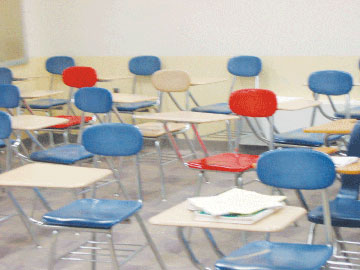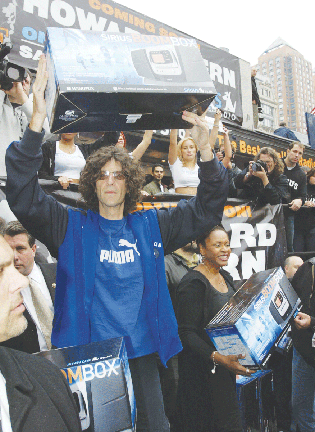Wilson: Campus Infrastructure Must Be Fixed
December 10, 2004
UMass President Jack Wilson last week restated his support for the urgent repairs of UMass Boston’s infrastructure in the quickly corroding upper and lower levels.
Speaking to student government officials as part of his day-long listening tour of the campus, Wilson said the repairs, expected to cost $50 million, are a high priority to him. “I can pledge to you I will put a lot of energy into that,” he said. “I believe we have to get this thing fixed.”
Wilson noted that he had submitted a formal letter to David Perini, head of the state’s Division of Capital Asset Management (DCAM) in early October “reaffirming a sense of urgency at our Boston campus.”
On November 1, he took Perini and several of Perini’s engineers on a walk-through of the infrastructure, which holds up and remains the foundation of the main five buildings of the campus: Healey Library, the Science Center, the Quinn Administration Building, and McCormack and Wheatley Halls.
Wilson said a strategy is being put together through DCAM and the state Legislature in order to fund the repairs. He said he had a discussion with Eric Kriss, Gov. Mitt Romney’s secretary of administration and finance, and brought the problem to the attention of a state Senate task force on higher education.
“We’ll keep working on it,” he said.
Wilson was taken around campus last week by Interim Chancellor Keith Motley, meeting with senior administrators, faculty, staff, and students, which Motley jokingly billed “Take Your President To Work Day.”
In his meeting with the student government leaders, Wilson noted that history has not been kind in the funding and understanding of public higher education. “We hope that’s beginning to turn a little bit,” he said, noting the increase in funding from the state Legislature. Shortly before Thanksgiving, Wilson testified before the Senate task force, expressing support for a rainy day fund that was suggested by state Sen. Stanley C. Rosenberg (D-Amherst), to help the university system deal with the ups and downs of state funding.
Wilson told student leaders he hopes to create more alumni spirit and identification with UMass by starting a downtown alumni club, with no university funds.
Unmentioned at the meeting was the law school proposal, a controversial plan that would merge UMass Dartmouth and the unaccredited Southern New England Law School, creating the first public law school in Massachusetts, one of six states without its own public law school. Critics, several of them state legislators and members from the area’s private law schools like Suffolk and New England School of Law, charge the school would be a drain on university and state funds, which UMass officials deny. The proposal has the support of the majority of the trustees, Wilson, and James Karam, chair of the UMass Board of Trustees and a Dartmouth alumnus.
The status of the law school proposal has not greatly changed, according to Robert Connolly, spokesperson for the UMass President’s Office. Karam is still considering calling a special meeting to vote on the proposal before the holidays, but it could also be carried over to February at the trustees’ next quarterly meeting, Connolly said.
Connolly downplayed the notion that UMass Amherst may be trying to quietly scuttle the proposal, with the campus fearful that university funds would be diverted towards maintaining the new law school. The proposal has the support of all five campus chancellors, Connolly said, including UMass Amherst chief John Lombardi.
The school would be a self-supporting, self-sustaining, and trust-funded entity, Connolly stated, with no diversion of funds from the other campuses needed. A compromise that includes capping the number of students and restricting the school to the region is being discussed, he said. The intention was always to have it in Dartmouth, he added.
The UMass Boston community, which came close many years ago to getting its law school through an unfulfilled merger with New England School of Law, appears to remain largely supportive of the proposal, with Motley, senior administration officials, and faculty voicing their backing of it.
“I support any opportunity to provide more access to our students,” said Motley, after the proposal was presented to trustees several weeks ago.






















































